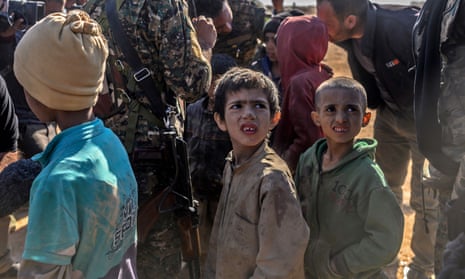Child survivors of Islamic State captivity and their families have been left to fend for themselves when dealing with lasting trauma and health complications, Amnesty International said on Thursday.
Almost 2,000 Yazidi children living in the Kurdish regional government area have been “effectively abandoned”, according to a new report highlighting their struggles to recover from the violence inflicted by Isis.
Many suffer from fits of anger, flashbacks and nightmares and have persisting health problems.
“These children were systematically subjected to the horror of life under Isis, and now they’ve been left to pick up the pieces,” said Matt Wells, Amnesty International’s crisis response deputy director.
“Their physical and mental health must be a priority in the years ahead if they are to fully reintegrate into their families and community.”
The 400,000 Yazidi minority were targeted in their heartland of the Sinjar mountains from August 2014 by Isis, which captured thousands of prisoners and turned them into slaves.
The report quotes a doctor who said almost every girl they had treated between the ages of nine and 17 had been the victim of sexual violence and now suffered from infection, irregular periods and difficulties in pregnancy and childbirth.
Some female survivors told Amnesty that the babies born as a result of the abuse have been socially ostracised and that many of them had to abandon their children and have not been allowed any contact since.
Many captured boys were left disabled after being forced to fight alongside Isis and have received no support since returning home, the report says.
The UN refugee agency’s special envoy, Angelina Jolie, quoted Amnesty’s research at the UN security council earlier this month, when she called for more support for Yazidi children.
“If we are not able to live up to our promise of a survivor-centred approach for Yazidi children, who make up just one relatively small group of survivors, then how many more children and young adults are suffering in silence at the global level?” the actor said.
Families have struggled to pay for their daily needs, according to Amnesty, especially as many only secured the freedom of their relatives by paying large ransoms to their Isis captors.
Suzan Nawaf, a community worker for the charity Mines Advisory Group, which has been helping to clear landmines from the Yazidi heartland on Mount Sinjar, said many impoverished Yazidi refugees have been forced to return there despite lingering dangers.
“After six years of displacement from Sinjar to the Kurdistan camps, now they have begun to return to their homes, but many of them can’t return because their houses have been destroyed,” she said.
Nawaf said the area was still littered with improvised landmines and unexploded ordnance. Many of the homes had been booby-trapped and conditions have been made worse by the coronavirus pandemic, which has limited the community’s ability to work and disrupted humanitarian aid.
“There is no electricity, there is no water, many of their houses are exploded so they are living in other houses or in tents. They depend on agriculture for their livelihoods but they cannot now do that because the agricultural area is contaminated [with explosives],” she said.
